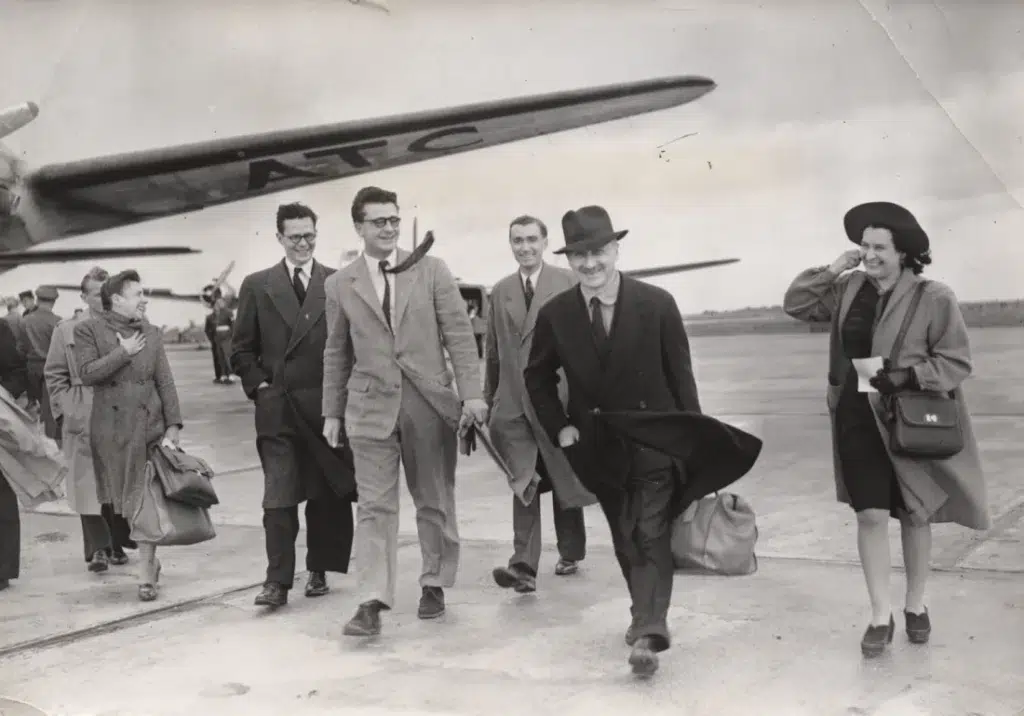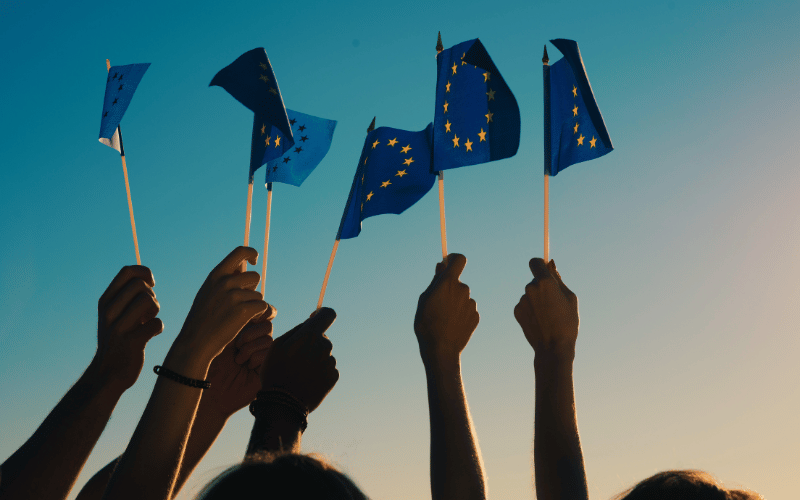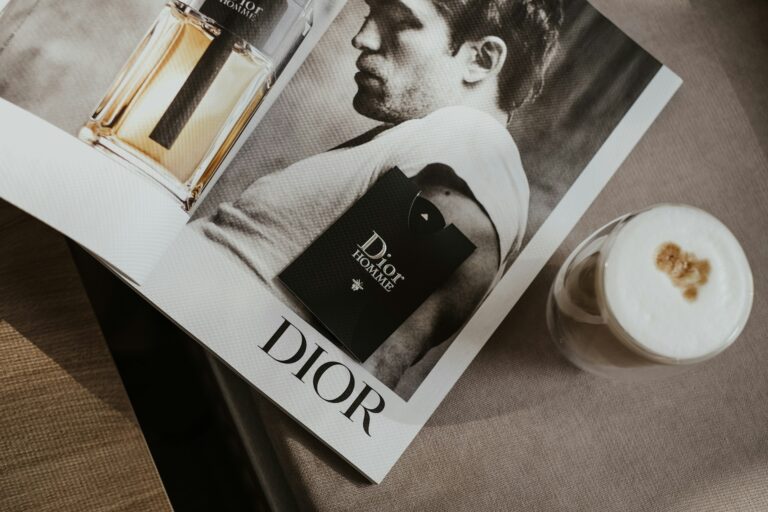The European Union faces several existential challenges. It’s game time for the most successful — yet still fragile — international project in history.
In this article I argue that to endure, prosper and accomplish ambitious integration objectives, the EU must also revisit its branding. Because collective action and true solidarity are impossible without shared emotions. I propose fostering love for ‘Brand Europe’ by creating Europe’s first hero movie.
And what better hero than Jean Monnet, a French cognac merchant, tireless adventurer, and the EU’s charismatic founding father?
Proven Systems for Business Owners, Marketers, and Agencies
→ Our mini-course helps you audit and refine an existing brand in 15 days, just 15 minutes a day.
→ The Ultimate Brand Building System is your step-by-step blueprint to building and scaling powerful brands from scratch.
Table of Contents
In the Footsteps of Umberto Eco
The late Umberto Eco loved the European idea. The Italian novelist and semiotician, however, also saw a problem. The European Union is losing the battle of emotions, as illustrated by British citizens’ choice to leave the European polity altogether.
Despite significant budgets allocated to mass communications, the EU acronym summons little sentiment in the hearts of most Europeans. Eco proposed to correct this situation. In a 2013 piece in La Repubblica’s L’Espresso, he put forward a plan to engineer the EU’s popular appeal by inventing a European hero, un Asterix Europeo. The suggestion received surprisingly little attention at the time.
Eco understood that the future of the European polity is directly tied to emotionally charged narratives. The last two decades of European politics showed time and again the reluctance of member-states to share each other’s burdens in the face of crisis: be it the European debt and monetary crisis, the refugee crisis, or the current crisis of Russian aggression near EU’s eastern borders. That’s because solidarity can’t function without the super-emotions that work through people’s hearts, nerves, and guts. None of the instrumental solutions to European challenges will be sustainable if not grounded in effective identity politics.
A world-class expert in constructing popular narratives and heroes, Umberto Eco believed that the same creative tools could be applied to the question of European identity. He proposed that we revisit European history and discover ’a European Asterix’, a hero of whom to speak to the Europeans of tomorrow.
Time is Ripe for a Jean Monnet Movie
The stakes are high. The European project will need to be fiercely defended both internally from right-wing populists and externally from Russia’s war machine, unchecked migration, and other geopolitical threats. Leaders like French President Emmanuel Macron are right to push for bold objectives like the EU’s strategic autonomy, the European army, and joint migration management. But projects like that require popular support, which will not come without love for ‘Brand Europe’. That’s why Europe needs a good story now more than ever before.
What I want to propose is an idea for a motion picture. It would tell the story of the EU’s defining hero, Jean Monnet (1888-1979), a master architect of Europe’s postwar reinvention, an avid advocate of European military integration, and a French cognac merchant who came to be known as the founding father of the European Union.
But it would have to be a very different kind of story. A good narrative for Europe would be about something other than the rights and wrongs of politics. The story would rather give people something to talk about at the dinner table, associating the European idea with pure excitement.
The Problem with Brand EU
The quest for the European ‘we-feeling’ is an old one. The EU institutions have been involved in this quest, at least since the 1970s, when the EU’s cultural policy commenced. Today, the EU’s efforts in this sphere are carefully monitored by the Eurosceptic press. For example, in the years leading up to Brexit, the pro-Brexit press was ringing the propaganda bells in reference to the EU’s multi-billion ’ad budget’ that was allegedly larger than Coca-Cola’s.
Despite the fears of the ever-vigilant Eurosceptics, EU communication currently offers little that can inspire spontaneous enthusiasm. That is why both branding experts and political scientists are critical of the European Union as a brand: not because the Union wants to be a brand, but because the branding strategy is outdated and out of touch with the contemporary communication space.
This space is characterized by the sheer plurality of mass, social, and blog media, which can choose to transmit, ignore, challenge, or modify the symbols and narratives launched from Brussels.
What’s more, as we have learned from the success stories of entertainment and marketing industries, people are much more enthusiastic when engaged as thrill-thirsty consumers rather than fact-seeking citizens. Facts, moral values, and political programs can be interesting, but what truly captivates people are fantasies, heroes, eccentricities, and creative deconstructions of ethical imperatives and conventions.
Any commercial or political project will ignore this rule at its own peril if what is targeted is the popular psyche. With this in mind, I wish to make a case for a very specific cultural project. Let us call it the Jean Monnet Movie Project.
The Fantastic Life of Mr. Europe

A script for the Jean Monnet movie is yet to be written, but there are plenty of biographical episodes that are available for adaptation.
Silhouette of an Assassin
Think of the story told by Fernand Javel, Monnet’s chauffeur in Algeria during WWII. Monnet traveled to Algeria to work alongside Charles de Gaulle for the Free French Forces. It was the spring of 1943, and both Monnet and Javel received warnings that the French monarchists were out to assassinate Monnet. In what is a colorful description of the event, Javel remembers traveling the lonely Algerian roads in the middle of the night when he suddenly noticed a man lying across the road: “Instead of stopping I accelerated as fast as I could and zig-zagged past him… Once the car had gone by, Monnet looked back and saw the silhouette stand up”.
Mad Marriage
Consider Jean Monnet’s love life and the hardships he had to go through in the 1930s to marry his beloved Silvia de Bondini, an Italian painter. Silvia was married to Francesco Giannini, an Italian diplomat who was Monnet’s employee. Francesco was reluctant to grant Silvia a divorce, and without the husband’s approval, the couple was out of options in the face of Italian and French legal settings of the day.
However, Monnet’s ‘can do’ attitude saves the day as he comes up with the most unconventional of plans. An entrepreneur, an anti-communist, and a lover of America to his very core, Monnet takes Silvia to communist Moscow (of all places), where it was possible to divorce and remarry at once. The plan works – the couple has a wedding before leaving the USSR forever. EU’s founding father would later describe his marriage as “the most beautiful operation of his career”.
Now, this may not be the behavior of saintly moral purity, but it shows determination, fight, and creativity, which are the things that famous heroes are made of. The point is precisely to move beyond the political black and white and discover humanity in all of its colors. Besides, would not most Europeans appreciate an EU that is a little less innocent and a little gutsier?
Bonjour, mademoiselle Bardot
Or think of some accidental chats that Monnet might have had with Brigitte Bardot when the two neighbored each other in Houjarray, some 80 kilometers outside of Paris. Think of the Frenchman’s friendship with John F. Kennedy, who credited Monnet for moving Europe “closer to unity in less than twenty years than it had done before in a thousand”.
The Great Gatsby
But make sure to contrast such praise with allegations of insidious business ventures. For instance, historians argue that one of Monnet’s roles in Canada as an eighteen-year-old representative of the ‘Cognac Monnet’ brand was to target the market of local Indians even though selling ‘firewater’ to Indians was prohibited by law at the time.
Because of murky episodes like that, one of his biographers, Frederic J. Fransen, saw ‘something of a Great Gatsby in him’. In fact, in the 1930s Monnet became (briefly) a millionaire, a high point of his career as an international banker that took him as far as China, where he worked between 1934 and 1936. Not much is known about his day-to-day routines in the sinful streets of Shanghai, or the ‘Paris of the East’ as the booming city was called in the 1930s. But many stories of adventure and suspense await to be told.
Burgers and Westerns
Think of Monnet’s initial and later reactions when he failed to secure a spot on the first and final voyage of the Titanic. Or imagine him demanding an American burger in a classy Parisian restaurant. Rubbing shoulders with Europe’s political and financial elites, Monnet was unusual in his passion for American pop culture, especially Westerns and fast food.
Max Kohnstamm, a Dutch diplomat, once recalled having to anticipate Monnet going to classy restaurants so that he could prevent Monnet’s grotesque scene of demanding the cook to make them burgers. As for Westerns, it is not so difficult to imagine the young Monnet himself having something of a wild West experience in North America, horseback riding to wherever his liquor interests would take him.
Cognac Adventures
The family’s cognac business gave Jean Monnet a unique opportunity to become a world-touring adventurer from a very young age. And he took it, leaving Cognac for London when he was merely sixteen years old. “Why take the roundabout of studying law when I could go to the school of life and see the world?” (Memoirs). And so he did, traveling to the ends of the world to develop a sales network for the up-and-coming Cognac Monnet brand (which you can still buy today!).
Before he was twenty-five, Monnet had already traveled extensively through Canada, Egypt, Greece, Sweden, and other countries, constantly breaking his back to outmaneuver the leading cognac brands of the day, Hennessy and Martel, as well as the emerging competition from whisky.
Lovable Europe

Exciting episodes were plentiful in the man’s life. Crucially, it is only in the context of these adventures and colorful episodes that Monnet’s European vocation could be communicated in a captivating fashion.
Monnet’s crowning achievement was to set in train, in the 1950s, the European integration process with the Schumann Plan and the European Coal and Steel Community. He effectively founded what is known today as the European Union. But this epoch-making episode should not be overstressed in the film’s narrative. In fact, Monnet’s pivotal role in the origins of the EU should probably be a side story.
It is noteworthy that official EU attempts to popularize the Jean Monnet story have been unsuccessful to date. That’s because the Jean Monnet of official EU booklets, commissioner speeches, and museum exhibitions is an uninspiring, one-dimensional ‘do-gooder’ European saint in a boring suit, completely lacking in charm, with nothing else on his mind but Europe.
Dull characters like that do not resonate with audiences spoiled by the golden age of TV series. Fortunately, we have just met a different Jean Monnet, a real European Asterix whose story is full of adventures, moral dilemmas, eccentricities, and jaw-dropping moments. That’s the stuff powerful brands are made of.
Branding works in mysterious ways. A leather jacket itself may have little to do with a sense of mystery, adventure, and power, but a marketer can devise a story in which a tough, jacket-wearing detective solves a case in a deserted factory. Mystery, adventure, and power suddenly become integral features of the jacket, much like the leather texture is its integral feature.
That’s why the link between this story (Monnet’s life) and the ideal promoted (the European Union) doesn’t have to be direct. There is no need to force the product onto consumers. There is no need to educate Europeans on how good the EU is for them. Rather, we should dissociate the story from the political ideal only to re-associate them indirectly, by investing the narrative with meanings, affects, and passions that draw popular attention.
The Jean Monnet Movie might be one way to start if we consider boosting enthusiasm for the European project. As Umberto Eco pointed out, most people love their heroes. He showed us a pathway towards creating a European tale. Now would be the perfect time to travel along it.
Credits
- Cover Image: Photo by Henri Lajarrige Lombard



![[object Object]](https://cdn.thebrandingjournal.com/wp-content/uploads/2024/06/Brand-Europe-Branding.jpg)





